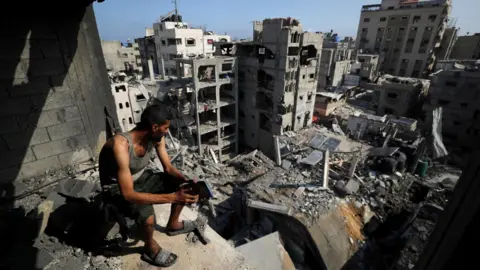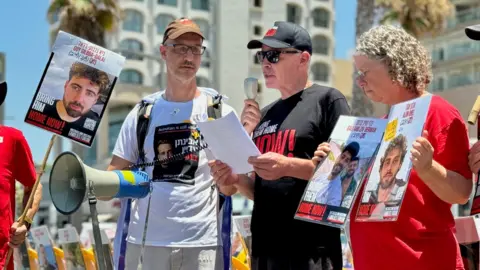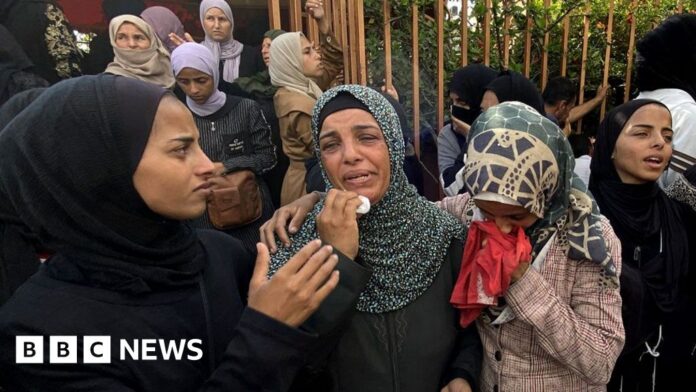 Reuters
ReutersHamas says it has delivered a “positive response” to mediators on the latest proposal for a new Gaza ceasefire and hostage release deal put forward by the US.
It added in a statement that it was “seriously ready to enter immediately into a round of negotiations”. It has not confirmed if it will accept the proposals yet.
Earlier on Friday Donald Trump said he expected a Hamas response within a day.
He said earlier this week that Israel had accepted the conditions necessary for a 60-day ceasefire, during which the parties would work to end the 20-month war.
The proposal is believed to include the staggered release of 10 living Israeli hostages and the bodies of 18 other hostages in exchange for Palestinian prisoners held in Israeli jails.
Fifty hostages are still being held in Gaza, at least 20 of whom are believed to be alive.
One of Hamas’s key demands is the resumption of unrestricted food and medical aid into Gaza, and the proposal reportedly says sufficient quantities would enter the territory immediately with the involvement of the United Nations and Red Cross.
It is said the plan would also include a phased Israeli military withdrawal from parts of Gaza.
Above all, Hamas wants a guarantee that Israeli air and ground operations will not resume after the end of the 60-day ceasefire.
The proposal is believed to say that negotiations on an end to the war and the release of the remaining hostages would begin on day one.
A positive Hamas response would then lead to the resumption of formal, indirect, talks ahead of a planned visit by Israeli Prime Minister Benjamin Netanyahu to Washington next week.
Meanwhile, the Israeli military is continuing to bomb targets across the Gaza Strip.
On Friday officials from the Hamas-run Gaza health ministry said Israeli attacks had killed at least 138 Palestinians over the previous 24 hours.
Overnight, at least 15 Palestinians were killed in strikes on two tents housing displaced people in the southern Khan Younis area, the local Nasser hospital said.
Thirteen-year-old Mayar al-Farr’s brother, Mahmoud, was among those killed.
“The ceasefire will come, and I have lost my brother? There should have been a ceasefire long ago before I lost my brother,” she told Reuters news agency at his funeral.
Adlar Mouamar, whose nephew Ashraf was also killed, said: “Our hearts are broken… We want them to end the bloodshed. We want them to stop this war.”
The Israeli military has not yet commented on the strikes, but did say its forces were “operating to dismantle Hamas military capabilities”.
Later on Friday the Red Cross said a staff member at the organisation’s field hospital in Rafah, in southern Gaza, had been hit by a stray bullet. His condition was stable after the “unacceptable” incident, the Red Cross said.
Meanwhile medical charity MSF said a former colleague had been killed the previous day when, it said, Israeli forces fired on people waiting for aid trucks in Khan Younis, in southern Gaza. At least 16 people were killed in the incident, MSF quoted teams at Nasser hospital in the city as saying. The IDF has not yet commented.
“The systemic and deliberate starvation of Palestinians for over 100 days is pushing people in Gaza to breaking point,” said Aitor Zabalgogeazkoa, MSF’s emergency coordinator in Gaza. “This carnage must stop now.”
 Kyla Herrmannsen / BBC
Kyla Herrmannsen / BBCIn the Israeli city of Tel Aviv, only 60km (40 miles) from Gaza, the families of the remaining hostages and their supporters held a rally outside the US embassy branch office, urging Trump to “make the deal” that would see them all released.
On the nearby beachfront, they laid out a giant banner featuring the US flag and the words “liberty for all”.
Among those who addressed the event was Ruby Chen, the father of Israeli-American Itay Chen. The 19-year-old soldier was killed during the Hamas-led attack on southern Israel on 7 October 2023 which triggered the war, and his body was taken back to Gaza as a hostage.
“I urge you Prime Minister Netanyahu to go to the US next week and bring back a deal that brings all the hostages home,” Mr Chen said. “There has to be a final, detailed agreement between Israel and Hamas.”
Keith Siegel, an Israeli American who was released in February during the last ceasefire after 484 days in captivity, also spoke.
“Many of my friends from Kibbutz Kfar Aza remain in captivity,” he said. “Only a comprehensive deal can bring them all home and create a better future for the Middle East.”
The primary concern for most Israelis is the fate of the remaining hostages and what might happen to them if the ceasefire does not happen and Netanyahu orders the Israeli military to step up its air strikes on Gaza.
There are plenty of reasons to hope, for these families, that the two sides can agree to a deal and achieve a lasting peace. But there is also anxiety, after the failure of previous efforts, that it might not happen.
On Thursday, Netanyahu promised to secure the release of all the remaining hostages during a visit to Kibbutz Nir Oz, a community near the Israel-Gaza border where a total of 76 residents were abducted on 7 October 2023.
“I feel a deep commitment, first of all, to ensure the return of all of our hostages, all of them,” he said. “We will bring them all back.”
He did not, however, commit to ending the war. He has insisted that will not happen until the hostages are freed and Hamas’s military and governing capabilities are destroyed.
The Israeli military launched a campaign in Gaza in response to the 7 October 2023 attack, in which about 1,200 people were killed and 251 others were taken hostage.
At least 57,130 people have been killed in Gaza since then, according to the territory’s Hamas-run health ministry.




